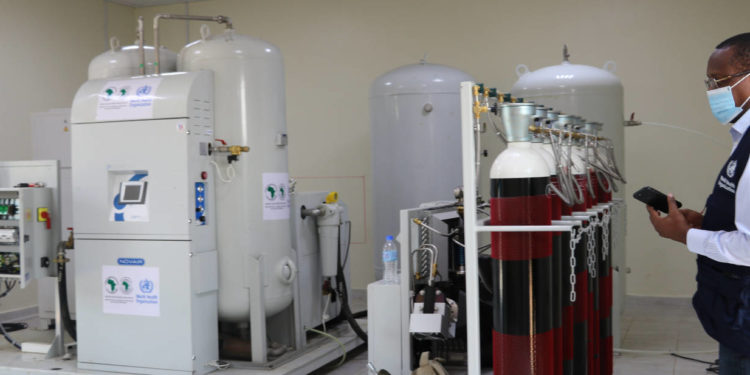South Sudan has begun producing oxygen following the successful installation of the country’s first oxygen plant at Juba Teaching Hospital, set up with funding from the African Development Fund.
The oxygen plant was procured as part of measures to support the country’s ongoing Covid-19 response with a grant from the African Development Bank Group’s concessional lending arm. The project was implemented by the World Health Organization (WHO) on behalf of the government.
With a generation capacity of 2,500 litres per day and the ability to refill around 72 D-type oxygen cylinders daily, the plant will be a centralized production and supply hub for remote locations. The equipment included 240 cylinders and four years of service and accessories. The $980 000 oxygen plant project cost includes the procurement and construction of a facility to house the plant.
South Sudan’s Health Minister, Elizabeth Achuei, said the installation of the plant was good news to the nation and would bolster the country’s preparedness for oxygen in anticipation of the third wave of Covid-19. “South Sudan will no longer be importing oxygen from neighbouring countries and this means oxygen will be supplied to facilities on time and more lives will be saved,” Achuei added.
“The installation of the oxygen plant will be a great boost to provide intensive care treatment to the critically ill Covid-19 patients” said Dr Fabian Ndenzako, the WHO Representative for South Sudan. The plant would strengthen the country’s health system and improve emergency preparedness, particularly in the country’s Covid-19 response.
Read also:
Covid hurdles: Kenyans are ‘hoarding’ more than 20,000 oxygen cylinders
SA´s unrest poses a threat to Namibia’s oxygen supply –Kalumbi Shangula
African Development Bank Country Manager for South Sudan, Benedict Kanu, said providing the oxygen plant formed part of efforts by the African Development Bank Group and its partners to build a robust and well-functioning health system in South Sudan to respond to health emergencies.
“The Covid-19 pandemic remains a major threat to South Sudan’s population and elsewhere in Africa. The Bank will continue to work with the government of South Sudan and its development partners like the WHO to ensure a timely response to the pandemic and future public health emergencies to save lives and livelihoods,” Kanu said.
Setting up isolation facilities
Through the Bank’s grant, WHO has renovated three isolation facilities in Wau, Yei and Nimule for the management of Covid-19 patients with mild symptoms who do not require hospitalization.
“We appreciate the Bank’s generous contribution,” said Dr Ndenzako. Timely facility-based isolation for mild COVID-19 cases reduces the number of new infections.”
The isolation facilities were handed over at a similar event on 1 September 2021, in the presence of the Minister of Health, the African Development Bank Country Manager, WHO Representative and other delegates and the media among others.
In June 2020, the African Development Bank Group approved a $4.2 million grant via its Covid-19 Response Facility to finance South Sudan’s response to the pandemic. It was the Bank’s first direct support to the country’s health sector. The project is implemented by the WHO in coordination with the Ministry of Health.
WHO has provided the Health Ministry with essential medicines, lifesaving biomedical kit and personal protective equipment through the grant. It also trained some 400 health workers to care for Covid-19 patients at national and sub-national levels across the country. The funds also went towards remodeling and equipping four Covid-19 treatment centers.









